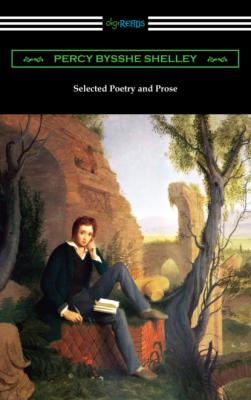Selected Poetry and Prose. Percy Bysshe Shelley
Чтение книги онлайн.
Читать онлайн книгу Selected Poetry and Prose - Percy Bysshe Shelley страница 50
 self-compassion; then his speech
self-compassion; then his speech
Was lost in grief, and then his words came each
Unmodulated, cold, expressionless,
But that from one jarred accent you might guess
It was despair made them so uniform;
And all the while the loud and gusty storm
Hissed through the window, and we stood behind
Stealing his accents from the envious wind
Unseen. I yet remember what he said
Distinctly; such impression his words made.
‘Month after month,’ he cried, ‘to bear this load,
And, as a jade urged by the whip and goad,
To drag life on—which like a heavy chain
Lengthens behind with many a link of pain!—
And not to speak my grief—oh, not to dare
To give a human voice to my despair,
But live, and move, and, wretched thing! smile on
As if I never went aside to groan;
And wear this mask of falsehood even to those
Who are most dear—not for my own repose—
Alas, no scorn or pain or hate could be
So heavy as that falsehood is to me—
But that I cannot bear more altered faces
Than needs must be, more changed and cold embraces,
More misery, disappointment and mistrust
To own me for their father…Would the dust
Were covered in upon my body now!
That the life ceased to toil within my brow!
And then these thoughts would at the least be fled;
Let us not fear such pain can vex the dead.
‘What Power delights to torture us? I know
That to myself I do not wholly owe
What now I suffer, though in part I may.
Alas! none strewed sweet flowers upon the way
Where, wandering heedlessly, I met pale Pain,
My shadow, which will leave me not again—
If I have erred, there was no joy in error,
But pain and insult and unrest and terror;
I have not, as some do, bought penitence
With pleasure, and a dark yet sweet offence;
For then,—if love and tenderness and truth
Had overlived hope’s momentary youth,
My creed should have redeemed me from repenting;
But loathed scorn and outrage unrelenting
Met love excited by far other seeming
Until the end was gained; as one from dreaming
Of sweetest peace, I woke, and found my state
Such as it is.——
‘O Thou my spirit’s mate!
Who, for thou art compassionate and wise,
Wouldst pity me from thy most gentle eyes
If this sad writing thou shouldst ever see—
My secret groans must be unheard by thee;
Thou wouldst weep tears bitter as blood to know
Thy lost friend’s incommunicable woe.
‘Ye few by whom my nature has been weighed
In friendship, let me not that name degrade
By placing on your hearts the secret load
Which crushes mine to dust. There is one road
To peace, and that is truth, which follow ye!
Love sometimes leads astray to misery.
Yet think not, though subdued—and I may well
Say that I am subdued—that the full hell
Within me would infect the untainted breast
Of sacred Nature with its own unrest;
As some perverted beings think to find
In soorn or hate a medicine for the mind
Which soorn or hate have wounded—Oh how vain!
The dagger heals not, but may rend again!
Believe that I am ever still the same
In creed as in resolve; and what may tame
My heart must leave the understanding free,
Or all would sink in this keen agony—
Nor dream that I will join the vulgar cry;
Or with my silence sanction tyranny;
Or seek a moment’s shelter from my pain
In any madness which the world calls gain,
Ambition or revenge or thoughts as stern
As those which make me what I am; or turn
To avarice or misanthropy or lust…
Heap on me soon, O grave, thy welcome dust!
Till then the dungeon may demand its prey,
And Poverty and Shame may meet and say,
Halting beside me on the public way—
“That love-devoted youth is ours—let’s sit
Beside him—he may live some six months yet.”
Or the red scaffold, as our country bends,
May ask some willing victim;